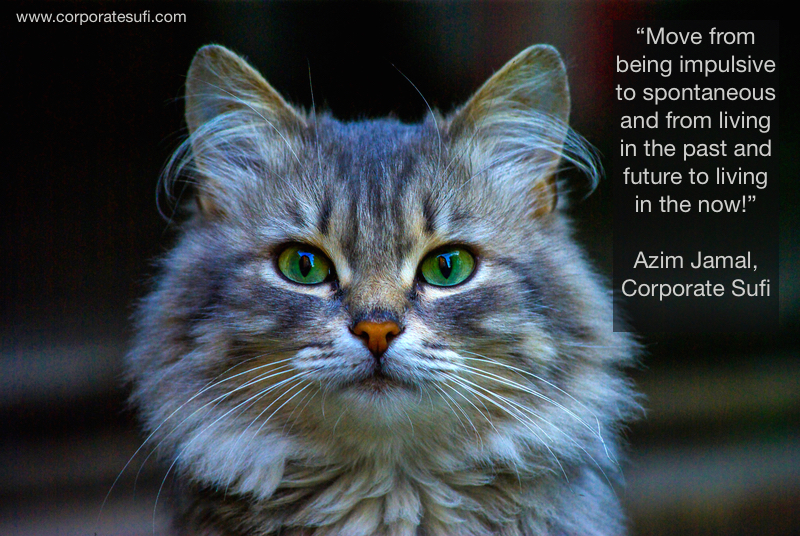Being in the moment, the now implies being alert and responsive to every moment. However, this approach might seem difficult for some, for it would mean relinquishing control of the future and exposing themselves to uncertainty. On the other hand, living according to a regimented plan could curb your natural spontaneity and creativity.
How do we decide when to be spontaneous or when to stick with our plans?
The Sufi knows that life is evolving every moment. So the real question is not about choosing between being spontaneous or following a plan, but identifying whether your action in that moment stems from your center or outside of it, from spontaneity or impulsiveness.
Spontaneity means acting naturally and effortlessly. Spontaneous energy is rooted in your very center of being.
For example, your four-year-old playfully splashes water on you and is looking forward to your response with an air of innocent amusement. One option is to reprimand and lecture him on good behavior and then get back to cleaning up the mess. The other option sees the bigger picture, i.e., looks beyond his act to understand his desire to engage with you. When a spontaneous person responds to the moment, he or she is accepting complete responsibility for that moment and is open to the interesting possibilities of life. The spontaneous action generally leaves you feeling joyful, liberated, and full of gratitude for life.
But when our behavior does not arise from within us, or is superficial, it becomes a reaction rather than a response.
For example, during an argument, you get caught up in the heat of the moment and say many things, which you regret later. Driving rashly, speaking rudely or indulging in repetitive mindless tasks are examples of impulsive behaviors.
At its peak, impulsive behavior can evolve into an addiction, for example, excessive shopping or binge eating. Impulsiveness is rooted in the ego (the false outer image of the self), driven by our baser instincts, and accompanied by guilt, regrets, or misery.
But if you are living in the present moment, you do not have to subscribe to old patterns. You can identify them and consciously avoid them. In fact, you can choose to be your best self, right now. For example, if you always dreamt of being someone who is calm and composed, start acting like a calm person right now. Identify and then practice the habits and thoughts which you think display a calm demeanor. Be that person right now. In the beginning, it might be difficult to remain mindful of this new change you want to make, but with consistent practice, you will start witnessing the desired transformation in yourself.
When you are in the now, your memories don’t pull you back, and your future expectations no longer confine you to a limited set of possibilities.
You act with complete awareness of the present.
It might be difficult to imagine this state of being since our very identity is rooted in our past. You think you are someone because you belong to a particular family, community or profession. But in the present moment, you realize that you are more than the sum total of your past and that you can start changing your reality right now. Of course, the effects might not be immediate, but you can begin the process.
One practice that can help you access this power of the now is meditation. Meditation brings you back to the present moment and connects you with your inner space. You experience the joy of being one with the now.
Ask yourself where are you in the journey between being impulsive vs being spontaneous and between living in the past/future and living in the now? Work on moving from being impulsive to spontaneous and from living in the past and future to living in the now!
